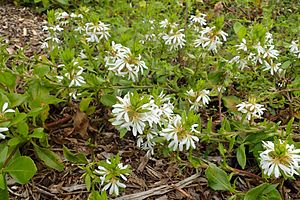Scaevola gracilis facts for kids
Quick facts for kids Scaevola gracilis |
|
|---|---|
 |
|
| Conservation status | |
|
Invalid status (NZ TCS)
|
|
| Scientific classification |
|
| Kingdom: | Plantae |
| Clade: | Tracheophytes |
| Clade: | Angiosperms |
| Clade: | Eudicots |
| Clade: | Asterids |
| Order: | Asterales |
| Family: | Goodeniaceae |
| Genus: | Scaevola |
| Species: |
S. gracilis
|
| Binomial name | |
| Scaevola gracilis |
|
| Script error: The function "autoWithCaption" does not exist. | |
| Synonyms | |
|
Lobelia gracilis (Hook.f.) Kuntze |
|
Script error: No such module "Check for conflicting parameters".
Scaevola gracilis is a special plant that grows in the Kermadec Islands and Tonga. It belongs to a plant family called Goodeniaceae. This plant is known for its slender look, which is where it gets its name.
About the Plant's Name
The Scaevola gracilis plant was first described in 1856. A scientist named Joseph Dalton Hooker gave it its first official description. The word gracilis comes from Latin and means "slender" or "thin." This name fits the plant because of its delicate appearance. Later, in 1998, another scientist, William Russell Sykes, found that a similar plant from Tonga was actually the same as Scaevola gracilis.
Where Scaevola Gracilis Lives
This plant is native to two main places. It grows on the Kermadec Islands, which are a group of islands north of New Zealand. It also lives in Tonga, a country made up of many islands in the South Pacific Ocean. These warm, island environments are perfect for Scaevola gracilis to thrive.
Conservation Status
Scientists keep an eye on how many Scaevola gracilis plants there are. In New Zealand, this plant is considered "At Risk - Naturally Uncommon." This means it's not found in many places there. The main reason for this is that it only grows in a small area. However, scientists also say that the plant is safe in other countries, like Tonga, where it is more common.
 | Georgia Louise Harris Brown |
 | Julian Abele |
 | Norma Merrick Sklarek |
 | William Sidney Pittman |

